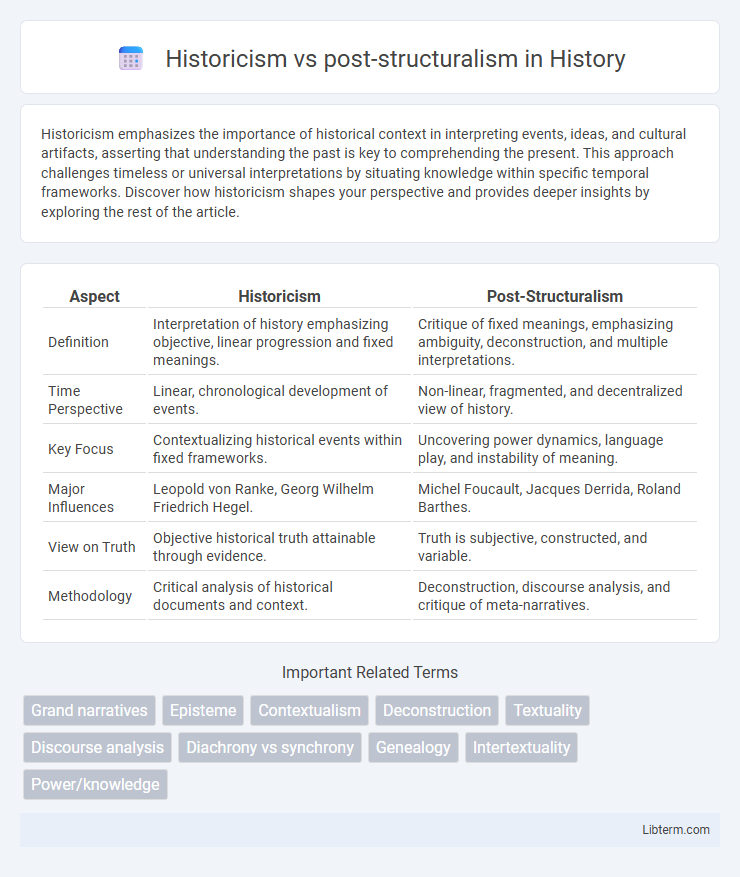Historicism emphasizes the importance of historical context in interpreting events, ideas, and cultural artifacts, asserting that understanding the past is key to comprehending the present. This approach challenges timeless or universal interpretations by situating knowledge within specific temporal frameworks. Discover how historicism shapes your perspective and provides deeper insights by exploring the rest of the article.
Table of Comparison
| Aspect | Historicism | Post-Structuralism |
|---|---|---|
| Definition | Interpretation of history emphasizing objective, linear progression and fixed meanings. | Critique of fixed meanings, emphasizing ambiguity, deconstruction, and multiple interpretations. |
| Time Perspective | Linear, chronological development of events. | Non-linear, fragmented, and decentralized view of history. |
| Key Focus | Contextualizing historical events within fixed frameworks. | Uncovering power dynamics, language play, and instability of meaning. |
| Major Influences | Leopold von Ranke, Georg Wilhelm Friedrich Hegel. | Michel Foucault, Jacques Derrida, Roland Barthes. |
| View on Truth | Objective historical truth attainable through evidence. | Truth is subjective, constructed, and variable. |
| Methodology | Critical analysis of historical documents and context. | Deconstruction, discourse analysis, and critique of meta-narratives. |
Introduction to Historicism and Post-Structuralism
Historicism analyzes cultural and literary texts in their specific historical contexts, emphasizing the influence of social, political, and economic factors on meaning. Post-structuralism challenges fixed interpretations by questioning the stability of language and meaning, highlighting the fluidity and contingency inherent in texts. Together, these approaches offer contrasting methods for understanding the relationship between history, language, and power in interpretation.
Defining Historicism: Core Principles
Historicism centers on understanding historical events and cultural artifacts within their specific temporal contexts, emphasizing the influence of time and environment on meaning. It asserts that knowledge and ideas are historically contingent, evolving through linear progression shaped by social, political, and economic forces. This approach contrasts with post-structuralism's skepticism of fixed meanings, as historicism prioritizes the recovery of original intentions and coherent narratives rooted in historical circumstances.
Understanding Post-Structuralism: Key Concepts
Post-structuralism challenges historicism by rejecting fixed meanings and singular interpretations, emphasizing the fluidity of language and power structures in shaping knowledge. Key concepts include deconstruction, which questions binary oppositions, and the idea that texts produce multiple, contradictory meanings rather than a stable truth. Influential thinkers like Michel Foucault and Jacques Derrida highlight how meaning is contingent upon context, discourse, and the dynamics of power.
Historical Context and Intellectual Origins
Historicism emerged in the 19th century, rooted in the Enlightenment's emphasis on progress and the belief that historical development follows a linear, objective trajectory shaped by cultural and social forces. Post-structuralism arose in the mid-20th century as a critique of structuralism and historicism, influenced by French philosophers like Foucault and Derrida, emphasizing the instability of meaning and the role of power in knowledge production. The intellectual origins of historicism prioritize historical determinism and context, while post-structuralism challenges fixed narratives and highlights the fluidity of interpretation.
Approaches to Text and Meaning
Historicism approaches text by interpreting meaning through historical context, emphasizing authorial intent and the socio-cultural conditions that shaped a work. Post-structuralism challenges this fixed interpretation, advocating for the instability of meaning and the role of reader perception, language play, and intertextuality in constructing multiple, fluid meanings. While Historicism seeks definitive understanding grounded in history, post-structuralism embraces ambiguity and the decentering of authority in textual analysis.
The Role of Power and Ideology
Historicism views power and ideology as historically situated forces shaping human events through identifiable structures and causal relationships. Post-structuralism challenges these fixed narratives by arguing that power is diffuse, pervasive, and embedded within language and discourse, constantly producing and shifting meanings. Michel Foucault's concept of power/knowledge exemplifies how ideology operates not as a singular entity but through complex social practices that govern knowledge and social order.
Subjectivity and the Construction of Knowledge
Historicism views subjectivity as shaped by historical contexts, emphasizing the influence of time and social conditions on the construction of knowledge. Post-structuralism challenges fixed meanings and objective truths, arguing that subjectivity is fluid and knowledge is constructed through language, power relations, and discourse. This shift highlights the instability of meaning and the role of interpretation in understanding reality.
Methodological Differences
Historicism employs a linear, context-driven methodology emphasizing the chronological development of ideas and events within their specific historical frameworks. Post-structuralism rejects fixed meanings and stable structures, favoring deconstruction and the analysis of language, power relations, and multiple interpretations to challenge traditional narratives. These methodological differences reflect historicism's focus on objective contexts versus post-structuralism's emphasis on subjectivity and textual instability.
Critical Debates and Controversies
Historicism emphasizes understanding cultural and social phenomena through historical context and continuous development, while post-structuralism challenges fixed meanings and stable structures, arguing that knowledge is subjective and fluid. Critical debates focus on historicism's perceived determinism and linear narrative versus post-structuralism's critique of essentialism and promotion of fragmented interpretations. Controversies arise over post-structuralism's alleged relativism, which some argue undermines objective historical analysis, contrasting with historicism's commitment to contextual truth.
Contemporary Relevance and Applications
Historicism emphasizes the importance of historical context in shaping cultural and social phenomena, influencing fields like historiography, cultural studies, and literary analysis to prioritize temporal specificity. Post-structuralism challenges fixed meanings and universal truths, promoting deconstruction and critical discourse analysis in contemporary philosophy, media studies, and identity politics. Both frameworks remain relevant in addressing power dynamics, narrative construction, and the fluidity of meaning in modern academic and social contexts.
Historicism Infographic

 libterm.com
libterm.com